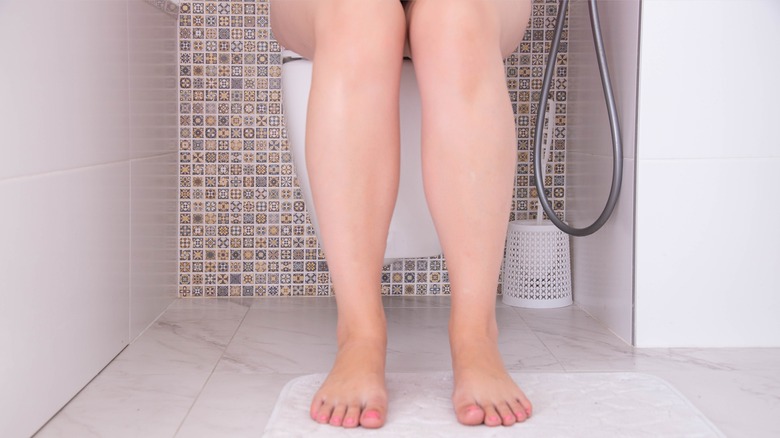Colon Cleanse Vs Laxative: What's The Difference?
We all likely agree that constipation can be more than just inconvenient — it can be downright frustrating and affect overall quality of life. When constipated, you might avoid exercising and dining out due to feelings of bloating and discomfort. Constipation is typically defined as having fewer than three bowel movements per week, or difficulty passing stool that is hard, dry, or painful, according the National Health Service (NHS). It can be caused by various factors, including a low-fiber diet, lack of physical activity, dehydration, certain medications, or frequently holding in stool when you have the urge to empty.
Depending on the severity and underlying cause of constipation, treatment can be successfully treated with diet changes. However, some people choose to use over-the-counter or prescription medications like laxatives, while others opt for more intense methods like a colon cleanse. Although colon cleansing and laxatives treat constipation, they work in different ways and have different goals.
How do colon cleansing and laxatives work?
A laxative is a substance used to relieve constipation by promoting bowel movements, per WebMD. Some laxatives increase the bulk and softness of stool, while others stimulate the digestive tract muscles to move stool or draw water into the intestines to soften the stool. Some laxatives are available over-the-counter or by prescription and come in many forms, including pills, powders, liquids, and suppositories.
A colon cleanse, on the other hand, is more invasive. During the procedure, 60 liters of water is used to flush out the colon via a tube placed in the rectum, explains Healthline. The goal of the cleanse is to remove built-up waste and toxins from the colon, which proponents of colon cleanses believe can bring numerous health benefits ranging from weight loss to improved energy. Colon cleansing shouldn't be confused with a bowel prep, which is conducted under the guidance of a doctor before a medical procedure like a colonoscopy, says the Cleveland Clinic
What's the main difference between the two?
While both a colon cleanse and laxative can help relieve constipation, a colon cleanse is more invasive, since a tube is inserted in the rectum. Consequently, colon cleanses can be riskier, with potential serious side effects including bowel perforation, infection, electrolyte imbalance (which could in turn lead someone to pass out or sustain kidney damage), and dehydration, per Healthline. On the other hand, laxatives may be a safer option for treating occasional constipation. However, they can also cause dehydration and other side effects.
It's important to speak with your doctor before starting any new medication or treatment. They might recommend other lifestyle changes, such as increasing fiber intake. If your diet is fiber-rich, you might experience more regular bowel movements. This is because fiber can bulk and soften poop to ensure it passes through the intestines faster, says the Mayo Clinic. Fiber can be found in a variety of foods, including fruits, vegetables, whole grains, wheat bran, and legumes. Staying hydrated and maintaining a regular exercise routine can also help prevent and treat constipation, explains Healthline.



